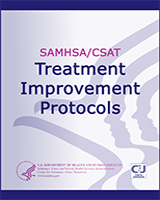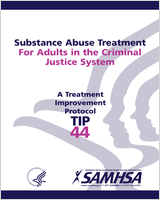NCBI Bookshelf. A service of the National Library of Medicine, National Institutes of Health.
Center for Substance Abuse Treatment. Planning for Alcohol and Other Drug Abuse Treatment for Adults in the Criminal Justice System. Rockville (MD): Substance Abuse and Mental Health Services Administration (US); 1995. (Treatment Improvement Protocol (TIP) Series, No. 17.)
This publication is provided for historical reference only and the information may be out of date.

Planning for Alcohol and Other Drug Abuse Treatment for Adults in the Criminal Justice System.
Show detailsSOUTH DAKOTA DEPARTMENT OF CORRECTIONS INTERAGENCY AGREEMENT:
- PARTICIPANTS:
- Unified Judicial Systems (UJS)S.D. Division of Alcohol and Drug Abuse (DIV)S.D. Department of Corrections Substance Abuse Program (DOC)
- PURPOSE:
- To provide for early identification of chemically dependent offenders to be treated in the community and to ensure that drug-involved offenders receive the appropriate treatment and supervision through early intervention, incarceration, treatment, and aftercare services.
- IDENTIFIED CLIENTS:
- Adolescent and adult drug/alcohol-involved offenders.
- INTERAGENCY GOALS:
- The UJS, DIV, and DOC will cooperate in the establishment of an alcohol/drug screening process to determine which offenders should be referred to a core service agency for alcohol/drug assessment. The results of the assessment will be included in the development of a recommendation to the court.Those individuals not institutionalized in a State corrections facility will receive appropriate chemical dependency services at an accredited alcohol/drug program.The DOC substance abuse program will assess all incoming individuals and, based on results of this assessment, will provide appropriate chemical dependency services.The DOC substance abuse program will refer all adults who have completed treatment to an accredited community-based treatment program for aftercare services. The DOC juvenile programs will make aftercare recommendations to the court services officers and will refer clients to community-based programs. The three agencies will develop followup procedures. The followup forms developed by the Attorney General's task force on drugs and that are currently in use will be utilized.The three agency directors will meet quarterly to discuss the agreement process. Meetings will also be held as needed, and other individuals may attend from time to time.The three agencies will abide by 42 C.F.R., Part 2. The division will provide training in the area of confidentiality issues to UJS and DOC staff.The policies of the three agencies regarding the use of urinalysis testing and breathalyzer use will be followed. Information will be shared regarding testing results when releases of information are obtained from clients.When alcohol/other drug offenders are referred to community-based agencies, the financial eligibility requirements of the agencies will apply. The DOC substance abuse programs will be provided at no cost to the clients.At the quarterly meetings, the three agency directors will discuss upcoming training opportunities and the need for cross-training on various topics. Mailing lists for training events will be expanded to include representatives from all three agencies.The natural supervision and chain-of-command processes will be followed by each agency.This agreement will be reviewed on an annual basis. If problems develop, they will be discussed by the directors at the quarterly meetings.
- Appendix C—Sample Interagency Agreement - Planning for Alcohol and Other Drug Ab...Appendix C—Sample Interagency Agreement - Planning for Alcohol and Other Drug Abuse Treatment for Adults in the Criminal Justice System
Your browsing activity is empty.
Activity recording is turned off.
See more...
